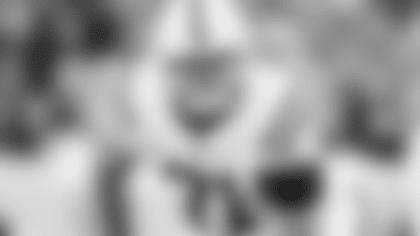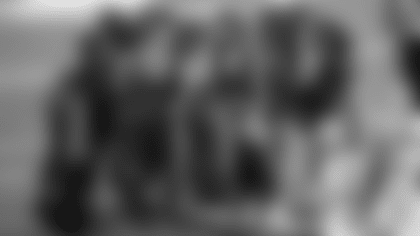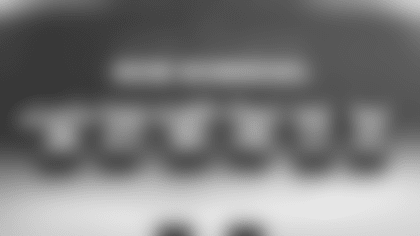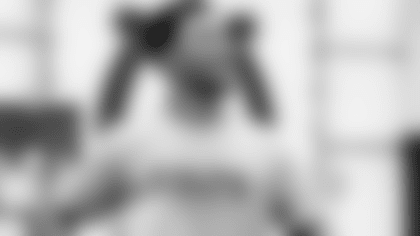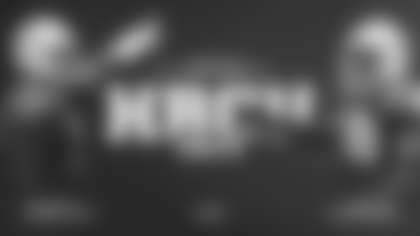What was your best sport growing up? For some people it might not have been football.
"I think I did a wide range of sports. I have two older brothers, Frank and Andrew. They played football and basketball, not so much baseball. We all did play Little League, but mostly it was football and basketball for me. I loved both of those sports. We had a great team in high school in basketball. My school was Dallas High School in Eastern Pennsylvania. We had a great team concept. It was a good experience, but it always was football for me."
Was it funny to go to a school named "Dallas" in the state of Pennsylvania? Did it get a reaction from fans of other schools?
"The school was in the Wilkes-Barre/Scranton area. It was on the Eagles' side of the state, the Philly side of things. Growing up I never went to a (professional) football game. It was good times in Pennsylvania, but we didn't do that. I never went to a Philly or Pittsburgh game. I always watched them on TV, of course. I was a senior in college when I saw my first NFL game live. It was in New York in 1987, the Giants were playing Green Bay. I don't remember anything about the game that much. It was a docile crowd, but a girl got up and made a show of herself. I thought, 'I like the NFL.' Our high school name, though never did get any bad reaction because of its name. It's a coal-mining era I grew up in. It was a family area and people were tight."
When did you start playing as a kid since football was a big part of the Pennsylvania culture?
"Growing up, I actually forged my mom's signature to get on a Pop Warner team. One of my buddies was going out for Pop Warner, so I tried to convince my parents, Frank and Natalie, to let me play, but they wouldn't let me do it. I had a couple of dollars and I think it was like $25 to join, so I forged my mom's signature to go play. I stored all my equipment in my buddy's tree house. I would go over to his house to get it. I only practiced two days before my mom found out. She was talking to my buddy's mother, and she found out. I had to take my equipment back. She and my father did not want us (their children) to play football. Eventually when we were old enough, we were allowed to play. That was when we were in junior high."
Who was the first true football influence you ever had?
"My oldest brother, Frank, I think was that first big influence. I was a water boy when he was playing in high school. He was a good wide receiver and defensive back. Just watching him play was fun. I was the worst athlete of the three boys. My brothers were talented. One was 6-5, the other was 6-2. I'm kind of the runt of the family, and I ended up actually playing (in college). The funny thing was my father did not want my two older brothers to play football in college. He was going to pay for the education and he made sure they concentrated on their education. When my time came, he still didn't want me to play. He worked his tail off to put three kids through college, and he didn't want me wasting my time, per se, doing other things. My brothers convinced him to let me go out for football in college. Back then we got a little bit of financial aid from Colgate, so it worked out for my father. He was happy that it helped out on the price of college, and things turned out pretty good for me. I was telling my brothers all the time, 'I really want to play.' I had a pretty good high school career like a lot of kids did. I was fortunate enough to get a couple of visits with colleges, and my brothers went to bat for me. They convinced my dad to let me go and check things out with a couple of schools. It paid off for me."
Now that football turned into a career, do your brothers remind you of that and what are they up to themselves?
"Frank, the oldest one, is down in Florida and is a private trainer. He has done that for a number of years. He went to college at Cortland State. Andrew works for Deloitte Touche and lives in Connecticut. He went to Lehigh and got a master's at Carnegie Mellon. I have some genes with some smartness (laughs). They give me a hard time about ending up with a career in football after what they did for me. They do it when we get together, but it's not often since we all have families. I haven't seen them this year, but we look forward to getting together on the East Coast later this year. I have never made a Super Bowl. If I ever am that fortunate, it would be fun to set them up with tickets and hotel rooms. It would be pleasurable for them and fun for all of us to share that experience. They got me into this line of work."
Your parents ended up liking what you did, didn't they?
"Once I got to college, my mom and dad ended up having some good years. When I went to Colgate, every weekend they had something to do. If we played Bucknell or Holy Cross, or wherever we played, they ended up tailgating and going to the games. I did not get drafted when I was done with my career at Colgate, but I was a free agent with the Washington Redskins. I was there three years, and my parents ended up coming to home games. They had their own room in my townhouse in Fairfax, Virginia. It was good and for those years I was there, they did a lot of traveling. It was fun for them to see that. My dad since has passed, but those were some fun times, and I know they enjoyed it."
Talk about yourself as a player. How would you characterize yourself?
"I was an intense guy, an impatient guy. I was basically a knowledgeable guy. I was physically gifted somewhat. Even today looking at players coming out in the draft and looking at players and even coaches in the league today, the one thing they do is produce some type of power out of their body. I was a powerful kid growing up working on construction sites with my father and doing that sort of thing. I was a powerful guy in the league, but I knew my role. I was a special teamer, a back-up guy. I learned football probably from Tony Dungy and Monte Kiffin. My fourth year in Minnesota, that's when I started to learn football. I took it from there. I knew my role. I studied as much as I could and when I did have an opportunity to play, I made sure I made the most of it."
Tony Dungy is a special guy, isn't he?"He is a special person coach. I have been around some Hall-of-Fame coaches. I expect he will be there one day, too."
Talk about the head coaches you played for in the NFL.
"I was under Joe Gibbs in Washington, a good Christian man. Joe was focused more on offense than anything else. Across the board, he was an offensive coach. He was a play-caller. One thing I learned from Joe was the structure of his program and loving his players. In coaching, you have to love your players. They're just like your kids. You're trying to steer them in the right direction and teach them the best way you know how. With players, it's the love that is going to get you through a lot of things. That's what Joe preached. He loved the group, and all the great coaches I've been around have loved the players. They loved being around them, the system and everything about coaching. That's how I feel, and I took that from the three years I was around Joe. In Minnesota, I was with Dennis Green. I didn't know much about him as a head coach, but Tony Dungy was there with Monte Kiffin. Those two gentlemen were the tops in the league, and that's when I started learning football and everything that went into the strategy – situational football, the needs at your position, what other guys and positions are doing around and in front of you. Tony is such a great guy, a committed Christian man. My last coach was Marty Schottenheimer at San Diego. Marty was a family man like the others were, too. They all believed in the trust factor amongst the team. I learned a lot of valuable lessons from Marty in terms of field position and turnovers. I must have heard the importance of those things about three million times from playing for him and coaching with him."
Is the best coaching done when affinity is matched with respect?
"I think it is. Everyone has his way of coaching this game. I tell players, 'I like country coaching.' Just make it plain, simple and easy so players can learn it the same way. You want them to understand things. You have a wide variety of guys in that room, and you need to reach each person. The most important thing is, 'I don't care what defense I call, you guys play it the way it should be played.' You have to play as a unit. You have to play as a team. I don't think you have to love each other so much. I hear guys say, 'I'd die for my teammate.' I would say, 'I wouldn't die for you. You're my teammate, but I would die for my family.' Football is a family-based deal to a degree, but it's also a business."
You hear about hidden yardage in games with special teams, but there is a lot of hidden impact there, too, right?
"You bet. You can win a lot of games with special teams. That is what Marty Schottenheimer taught. Field position is critically important. It is an easy thing to say ('hidden yardage') as a catch-phrase, but every coach knows the truth in it."





